Mental Health
Tea for Dementia: Choosing the Best Blend
Kickstart your journey to combating dementia with the perfect tea blend packed with antioxidants and cognitive benefits – find out which teas to choose for optimal brain health!

When considering the best tea blend to address dementia, it's important to focus on antioxidants and cognitive properties in tea choices. Opt for blends like green tea, rich in EGCG that reduces toxic amyloid-beta levels. Look for saponin E1, L-theanine, and theaflavins supporting cognitive function. Herbal teas like Bacopa monnieri and Lion's Mane offer memory and brain cell growth benefits. Selecting teas with brain-protective ingredients can lessen dementia risk. Explore caffeine-free options such as chamomile and peppermint for relaxation. Remember, choosing the right blend can positively impact brain health and cognitive function.
Key Takeaways
- Select antioxidant-rich teas like green or black tea to lower dementia risk.
- Consider teas with brain-protective compounds like EGCG and theanine.
- Choose herbal teas with cognitive-enhancing ingredients such as Bacopa monnieri.
- Opt for caffeine-free options like chamomile or peppermint for relaxation.
- Prioritize hydration with herbal teas to support cognitive function in dementia care.
Antioxidant-Rich Tea Blends
When it comes to enhancing brain health and potentially lowering the risk of dementia, antioxidant-rich tea blends play an essential role. These tea blends, including green tea, black tea, and herbal teas, contain bioactive compounds that have been linked to dementia prevention.
For instance, green tea contains EGCG, a powerful antioxidant with neuroprotective properties that can potentially reduce toxic Aβ levels associated with dementia. Other components like saponin E1, L-theanine, and theaflavins found in various tea blends exhibit mechanisms that support brain health and cognitive function.
Studies have shown that regular consumption of antioxidant-rich teas can lead to a 29% decreased risk of all-cause dementia, making them a valuable addition to one's daily routine for overall brain health.
Selecting the best tea blend for dementia prevention involves considering the specific antioxidants and neuroprotective properties present in the tea. By incorporating these antioxidant-rich tea blends into our diet, we may be taking a proactive step towards maintaining a healthy brain and potentially lowering the risk of dementia.
Cognitive Health Herbal Teas

Exploring the benefits of cognitive health herbal teas reveals promising effects on memory and cognitive function, showcasing their potential as natural aids in enhancing brain health. These herbal teas, including Bacopa, Ginkgo, Green Tea, Lemon Balm, and Sage, offer a variety of cognitive-enhancing properties worth considering:
- Bacopa monnieri: Traditionally known as Brahmi, this herb has a history of use in enhancing memory and cognitive performance, making it a valuable ingredient in cognitive health teas.
- Ginkgo biloba: Researched for its positive impacts on attention and executive function, Ginkgo shows potential in benefiting cognitive health, making it a valuable addition to herbal tea blends.
- Green tea: Rich in antioxidants like EGCG, green tea consumption has been linked to lower dementia risk and improved cognitive function, highlighting its significance in cognitive health herbal teas.
- Lemon Balm and Sage: These herbs are renowned for their memory-enhancing properties, offering potential benefits for cognitive function and overall brain health when included in herbal tea blends.
Brain-Protective Tea Ingredients
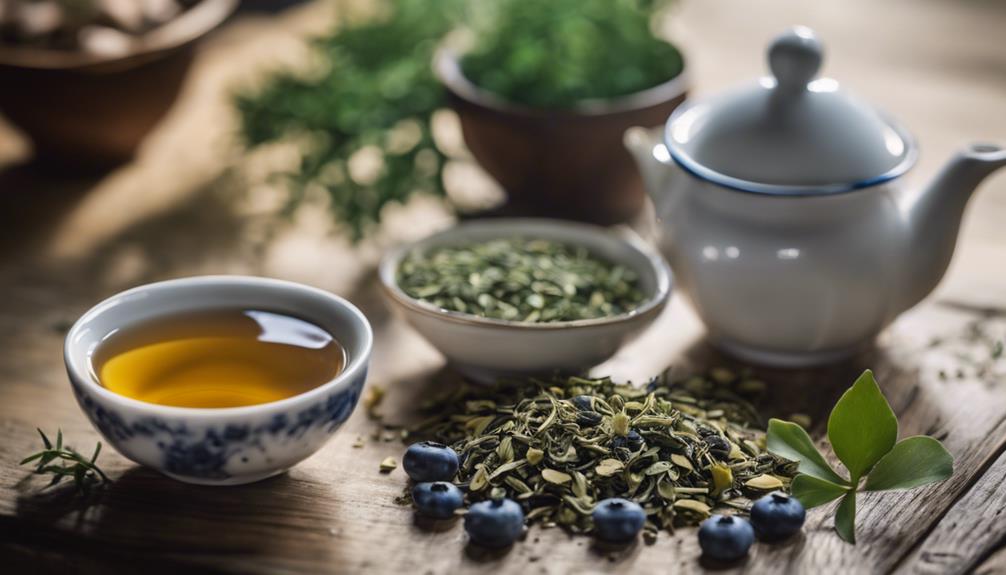
Exploring the domain of brain-protective tea ingredients reveals a wealth of compounds that promote cognitive health and safeguard against neurocognitive disorders.
Green tea, known for its high EGCG content, has shown promise in reducing toxic amyloid-beta levels in the brain, potentially impacting the progression of Alzheimer's disease.
Theanine, caffeine, and theaflavins present in tea exhibit neuroprotective mechanisms, contributing to cognitive health and brain protection.
Hibiscus tea stands out for containing gossypetin, a beneficial compound that supports brain health and may aid in preventing neurocognitive disorders.
Herbal teas like lemon balm and sage, when incorporated into one's routine, can support memory improvement and cognitive function.
Research underscores the significance of selecting tea blends with brain-protective ingredients to reduce the risk of dementia.
Embracing the potential benefits of these natural compounds through tea consumption offers a proactive approach to preserving cognitive well-being and defending against neurocognitive challenges.
Caffeine-Free Tea Selection

Exploring the world of caffeine-free teas presents a soothing alternative for those seeking a calming experience without the effects of caffeine. When considering herbal teas that promote relaxation, several caffeine-free options stand out:
- Chamomile Tea: Known for its calming properties, chamomile tea is a popular choice for winding down and reducing stress levels.
- Rooibos Tea: This South African herbal tea is caffeine-free and rich in antioxidants, offering a smooth and soothing taste that aids in relaxation.
- Peppermint Tea: Invigorating and caffeine-free, peppermint tea not only supports digestion but also helps to relax the mind and body.
- Hibiscus Tea: With its vibrant color and tangy flavor, hibiscus tea is caffeine-free and packed with vitamin C, promoting a sense of calm and relaxation.
Choosing caffeine-free herbal teas can provide individuals with dementia a gentle way to unwind, alleviate stress, and enhance their overall well-being.
Hydrating Tea Options
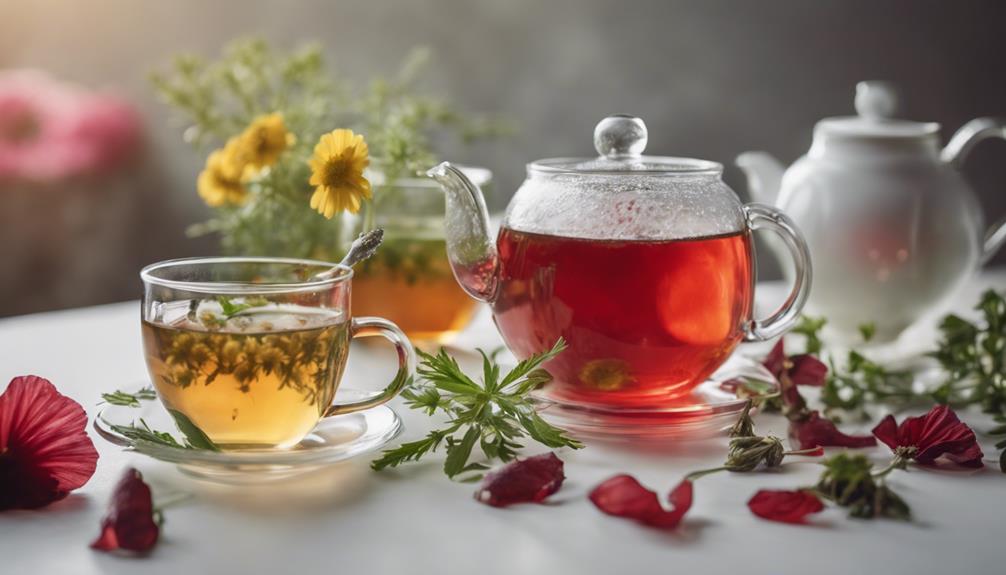
When considering tea options for individuals with dementia, hydrating choices like chamomile and hibiscus herbal teas can play an important role in promoting hydration and overall well-being.
Herbal teas aren't only flavorful but also offer a hydrating alternative for dementia patients. Proper hydration is essential for cognitive function and overall health in individuals with dementia. Tea blends infused with natural herbs can provide a pleasant and beneficial way to guarantee hydration in dementia care.
By choosing hydrating tea options, caregivers can contribute to a holistic approach to dementia care, addressing hydration needs while also promoting overall well-being. Chamomile tea, known for its calming properties, can be a soothing option that encourages hydration. Hibiscus tea, with its vibrant color and tangy taste, is another hydrating choice that can be enjoyed hot or cold.
Incorporating these herbal teas into the daily routine can help maintain adequate hydration levels for individuals with dementia.
Pleasant Taste Tea Recommendations

We find that incorporating herbal blends like Chamomile Dream and Morning Blend Organic Black Tea can offer individuals seeking dementia-preventive benefits a pleasant taste experience. These tea varieties not only provide a soothing and enjoyable tea-drinking experience but also potentially aid in cognitive health and memory support.
Here are some tea recommendations to enhance your cognitive well-being:
- Chamomile Dream: Known for its calming properties, this herbal blend can help reduce stress and promote relaxation, supporting overall brain health.
- Morning Blend Organic Black Tea: Rich in antioxidants, this tea blend can enhance cognitive function and memory retention, making it a flavorful choice for those interested in dementia prevention.
- Hibiscus Tea: Packed with antioxidants, hibiscus tea offers a tangy and invigorating taste while providing brain-boosting benefits.
- Trappist Monk Organic Black Tea: This tea variety not only delights the taste buds but also supports cognitive function, making it a delightful addition to your daily routine.
Lions Mane Tea Benefits

Let's explore the benefits of Lions Mane tea and its potential impact on cognitive function. Lions Mane tea is known for stimulating brain cell growth, which can aid in cognitive function and memory. It contains bioactive compounds that may improve brain health, making it a valuable addition to a dementia prevention regimen. This tea is believed to assist in removing brain plaque and tangles associated with Alzheimer's disease. Lions Mane tea is rich in natural antioxidants and low in tannins, offering a flavorful and health-promoting option for brain health. Here is a table summarizing the key benefits of Lions Mane tea:
| Benefit | Description |
|---|---|
| Cognitive Function | Stimulates brain cell growth, potentially aiding in memory and cognitive function. |
| Brain Health | Contains bioactive compounds that improve brain health and may help prevent dementia. |
| Alzheimer's Disease | Assists in removing brain plaque and tangles, which are associated with Alzheimer's disease. |
Incorporating Lions Mane tea into your routine may be a beneficial choice for those looking to support brain health and cognitive function.
Cats Claw Tea Benefits

Cats Claw tea offers a range of health benefits that can aid in managing Alzheimer's disease symptoms. From its potential to remove brain plaque and tangles to its neuroprotective properties, this herbal infusion is a promising option.
However, it's important to be aware of potential side effects and to brew Cats Claw tea correctly for best results.
Health Benefits Explained
The health benefits of Cats Claw tea are well-supported by research, particularly in its potential to help remove brain plaques and tangles associated with Alzheimer's disease. Cats Claw tea offers various advantages for cognitive function and brain health, making it a promising option for those concerned about dementia.
- Alzheimer's Support: Cats Claw tea contains bioactive compounds that aid in the removal of brain plaques and tangles, which are hallmark features of Alzheimer's disease.
- Brain Health: The antioxidant properties of Cats Claw help protect brain cells from damage and support overall brain health.
- Cognitive Function: Regular consumption of Cats Claw tea may enhance cognitive function due to its ability to support neural pathways in the brain.
- Alzheimer's Prevention: Research suggests that incorporating Cats Claw tea into your daily routine may reduce the risk of developing Alzheimer's disease, making it a proactive choice for brain health.
Brewing Tips and Tricks
With its rich antioxidants and potential cognitive benefits, brewing Cats Claw tea properly is crucial for harnessing its full potential. Cats Claw tea, known for its ability to remove brain plaque and tangles linked to dementia, offers a promising choice for brain health. The tea's high antioxidant content and low tannin levels make it ideal for supporting cognitive function.
To bring out the best flavors without bitterness, consider infusing Cats Claw tea leaves multiple times throughout the day.
For top-notch brewing, steep 2-3 teaspoons of Cats Claw tea in 12-18 ounces of water at a temperature exceeding 200 degrees Fahrenheit for approximately 10 minutes. This method ensures the extraction of beneficial botanical compounds that may reduce the risk of developing Alzheimer's disease.
Enjoy this tea in the morning or early afternoon to reap its full brain-boosting potential. Experimenting with brewing techniques can lead to a personalized experience and a deeper appreciation for the benefits of Cats Claw tea.
Potential Side Effects
Admittedly, some individuals may experience mild digestive discomfort when consuming Cats Claw tea due to its high antioxidant content. However, these side effects are typically minimal and transient.
Here are some key points to keep in mind:
- Vital Importance of Moderation:
While Cats Claw tea offers numerous potential benefits for Alzheimer's patients, excessive consumption may lead to gastrointestinal issues. It's advisable to start with small amounts and gradually increase intake.
- Consultation with Healthcare Provider:
Individuals with pre-existing digestive conditions should consult their healthcare provider before incorporating Cats Claw tea into their routine. This precaution can help mitigate any potential side effects and ensure safe consumption.
- Being Mindful of Adverse Reactions:
Monitoring for any adverse reactions is essential, especially when introducing a new tea blend. Being attentive to how the body responds can help identify and address any side effects promptly.
- Maintaining Balanced Consumption:
To reap the benefits of Cats Claw tea's bioactive compounds and antioxidants while minimizing side effects, maintaining a balanced and varied diet is important. Incorporating a diverse range of nutrients can support overall health and well-being.
Tea for Brain Cell Growth
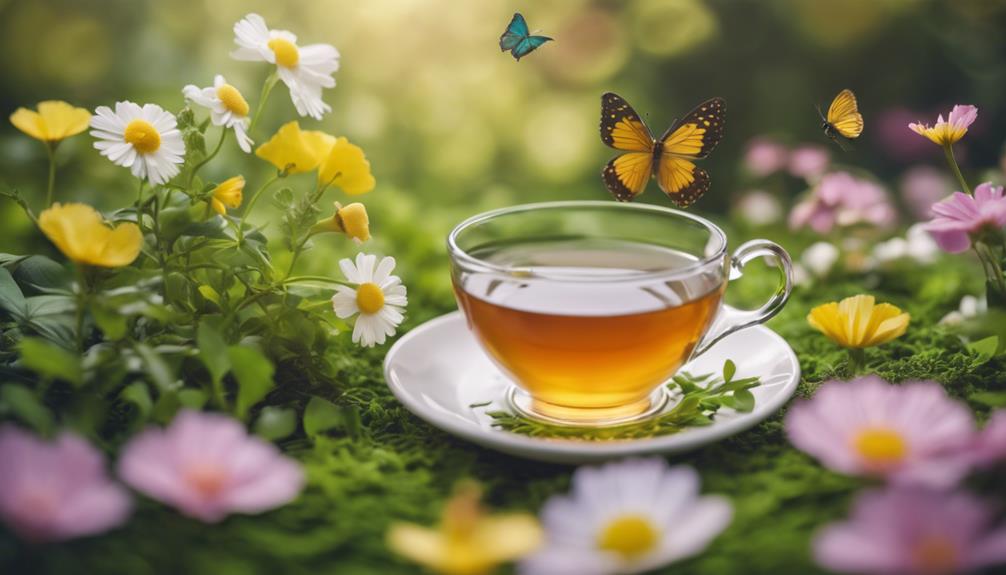
Stimulating brain cell growth, green tea has been found to contain catechins and L-theanine. These antioxidants and bioactive compounds play an essential role in promoting brain health and cognitive function.
Through research, it has been confirmed that the antioxidants in green tea have beneficial effects on the brain, aiding in the growth of brain cells. Additionally, compounds like EGCG found in green tea have preventive properties against dementia, further highlighting the positive impact of green tea on brain health.
In some tea blends, ingredients like Lions Mane and Cats Claw are included to support brain cell growth and reduce plaques, enhancing the overall cognitive function. By choosing tea blends rich in antioxidants and natural compounds, individuals can actively contribute to the maintenance and promotion of brain health.
Incorporating these teas into a daily routine may offer long-term benefits for brain cell growth and cognitive function, making green tea a valuable addition to a healthy lifestyle.
Tea for Alzheimer's Prevention
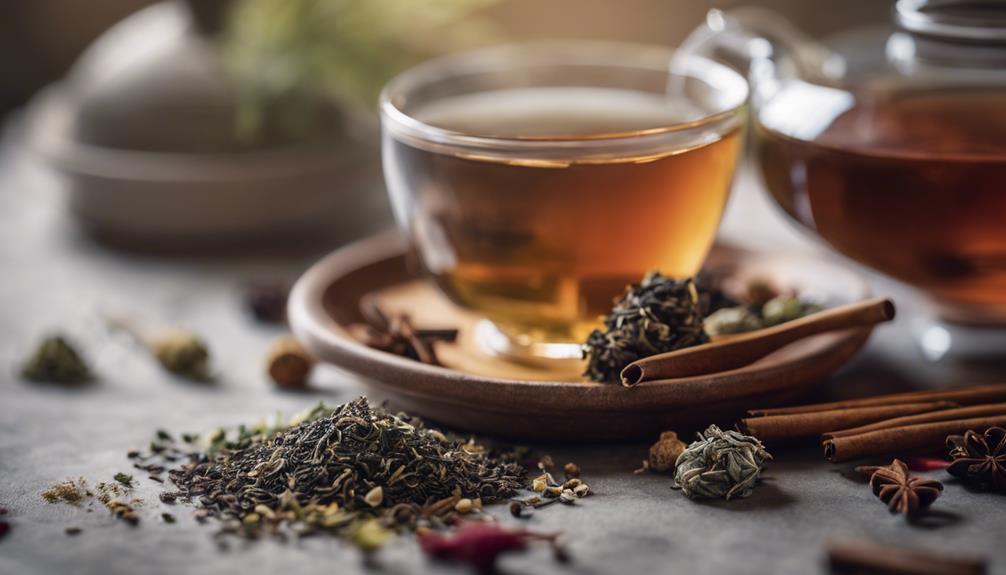
Green tea and oolong tea, known for their bioactive compounds, have been linked to Alzheimer's prevention. Research from the University of California at Berkeley supports the curative and preventative properties of EGCG in green tea against Alzheimer's disease.
The natural antioxidants in tea blends offer potential medical benefits in reducing Alzheimer's risk, emphasizing the importance of natural remedies in cognitive health.
Tea and Brain Health
How can tea consumption potentially contribute to preventing Alzheimer's disease and promoting brain health?
Tea, with its rich blend of bioactive compounds, has shown promising results in reducing the risk of cognitive decline and dementia.
Here are four ways tea can positively impact brain health:
- Protective Polyphenols: The polyphenols found in tea, such as EGCG, have neuroprotective properties that may help in reducing toxic Aβ levels in the brain, a hallmark of Alzheimer's disease.
- Enhanced Cognitive Function: Regular tea consumption has been linked to improved cognitive function, potentially slowing down the progression of cognitive decline associated with aging.
- Reduced Dementia Risk Factors: Components like theanine and caffeine in tea have been associated with a decreased risk of dementia, making tea a valuable addition to a brain-healthy diet.
- Beneficial for Specific Groups: Tea consumption is particularly advantageous for individuals over 65, smokers, and those with specific genetic characteristics, offering tailored benefits for reducing the risk of developing dementia.
Benefits of Tea
Tea consumption, particularly of green and black tea, has been positively associated with reducing the risk of developing dementia, showcasing its potential as a preventive measure against Alzheimer's disease.
The bioactive compounds found in tea, such as polyphenols and theanine, play a significant role in enhancing cognitive function and providing neuroprotective effects.
Studies have indicated that regular tea intake can lower the risk of all-cause dementia by up to 29%.
Green tea, specifically, contains EGCG, a compound known for reducing toxic Aβ levels in the brain and offering neuroprotective properties.
By incorporating tea into daily routines, individuals may benefit from a simple lifestyle change that could potentially help in preventing the onset of dementia.
These findings highlight the promising role that tea, especially green and black varieties, can play in maintaining brain health and reducing the risk of cognitive decline associated with aging.
Alzheimer's Risk Reduction
Consuming tea has been shown to be an effective measure in reducing the risk of developing Alzheimer's disease. When it comes to Alzheimer's risk reduction, tea consumption plays an important role. Here are some key points to bear in mind:
- Green and black tea have been linked to a 12% reduction in the risk of developing Alzheimer's disease.
- Tea intake is particularly beneficial in reducing the risk of vascular dementia compared to Alzheimer's disease.
- Individuals aged 65 and above can experience a 32% decrease in the risk of all-cause dementia by incorporating tea into their daily routines.
- Smokers may see more significant benefits in reducing dementia risk through tea consumption.
Incorporating tea into one's daily habits not only offers a comforting ritual but also holds the potential to lower the risk of developing Alzheimer's disease. This simple lifestyle choice may have profound effects on cognitive health, especially in older individuals and those at higher risk of dementia.
Frequently Asked Questions
What Is the Best Tea for Dementia Patients?
For dementia patients, the best tea choice may vary based on individual needs and preferences. Consider green tea for its antioxidants, chamomile for relaxation, hibiscus for brain health, or black tea for memory and concentration.
Which Tea Is Best for the Brain?
When it comes to boosting brain health, nothing beats the power of green tea! Packed with neuroprotective catechins, like EGCG, it's our top choice for enhancing cognitive function, memory, and overall brain wellness.
What Is the Best Drink for Dementia?
We believe green and black tea are beneficial for dementia. Tea consumption may reduce risks and support brain health. Chamomile, hibiscus, and herbal teas like bacopa and ginkgo offer cognitive benefits. Incorporating tea into daily routines can be beneficial.
Does Chamomile Tea Help Dementia?
Oh, you bet chamomile tea helps with dementia! It's like a soothing hug for the brain. With its calming properties, anti-inflammatory effects, and sleep-promoting powers, chamomile is the MVP for cognitive well-being.
Conclusion
Ultimately, selecting the right tea blend for dementia support plays a key role in promoting cognitive health. By opting for antioxidant-rich teas, brain-protective ingredients, and caffeine-free options, individuals can help prevent and manage symptoms of dementia.
With hydrating tea selections like Lions Mane and Cats Claw, one can further support brain cell growth and potentially reduce the risk of Alzheimer's.
Remember, the power of tea lies not just in its flavor, but in its potential to nourish and protect the mind. Choose wisely.
Mental Health
Herb Boosts Brain Power: Bacopa Monnieri Insights
Yielding unparalleled cognitive advancements, discover the scientifically-backed benefits of Bacopa Monnieri, the ancient Indian herb revolutionizing brain function.
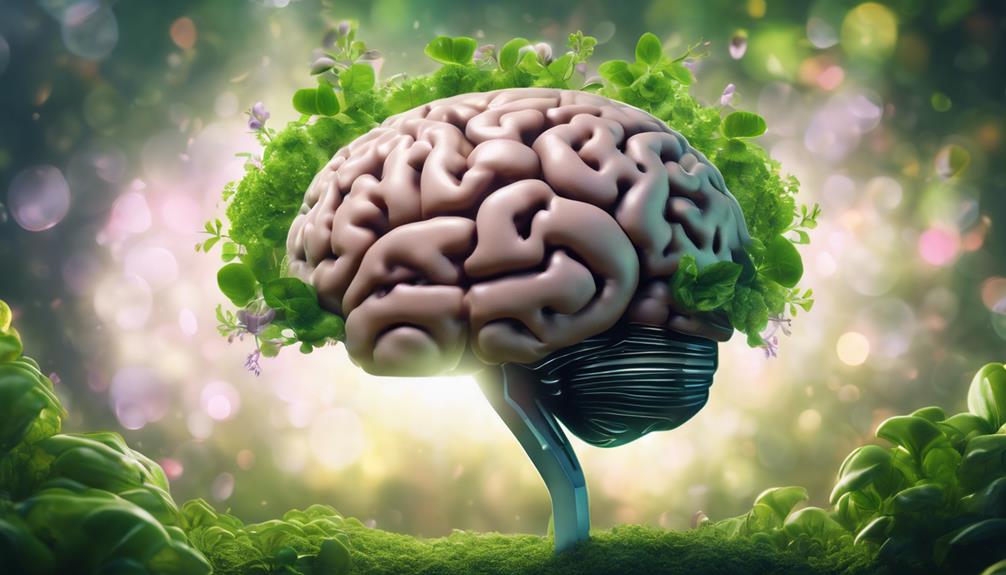
Bacopa Monnieri, an ancient Indian herb, has been esteemed for centuries for its profound impact on cognitive function, particularly in enhancing memory, attention, and processing speed. Its active compounds, bacosides, play a pivotal role in optimizing neural communication and synaptic transmission. Clinical trials consistently validate Bacopa Monnieri's cognitive-enhancing properties, demonstrating improvements in memory recall, attention, and cognitive processing. With a recommended dosage of 300-450 mg of standardized extract, Bacopa Monnieri stands out among cognitive enhancers, excelling in improving cognitive function. As you explore the mechanisms behind its brain-boosting capabilities, you'll uncover the scientifically-backed benefits of this incredible herb.
Key Takeaways
• Bacopa Monnieri enhances memory recall, retention, and cognitive processing, with ideal dosage and administration maximizing its cognitive potential.
• Clinical trials consistently validate Bacopa Monnieri's cognitive-enhancing properties, demonstrating improvements in memory recall, attention, and cognitive processing.
• A recommended dosage of 300-450 mg of standardized extract with 50% bacosides is recommended, with consultation from a healthcare provider before starting supplementation.
• Bacopa Monnieri's unique mechanism of enhancing neural communication sets it apart from other cognitive enhancers, making it superior in improving cognitive function.
• Bacosides repair damaged neurons, combat oxidative stress, and enhance synaptic activity, leading to improved memory consolidation and attentional capacities.
Unlocking Bacopa's Cognitive Potential
Research has consistently demonstrated that Bacopa Monnieri's cognitive-enhancing properties can be harnessed by ideal dosage and administration, leading to significant improvements in memory recall, retention, and cognitive processing. By optimizing the dosage and administration of Bacopa Monnieri, individuals can maximize its full cognitive potential.
The herb's active compounds, such as bacosides, enhance neurotransmitter function, supporting neural communication essential for memory and learning. This, in turn, improves synaptic transmission, important for cognitive functions. As a result, Bacopa Monnieri has been shown to enhance memory recall, retention, and cognitive processing, making it a valuable supplement for individuals seeking to improve their cognitive abilities.
Scientific Evidence for Brain Enhancement
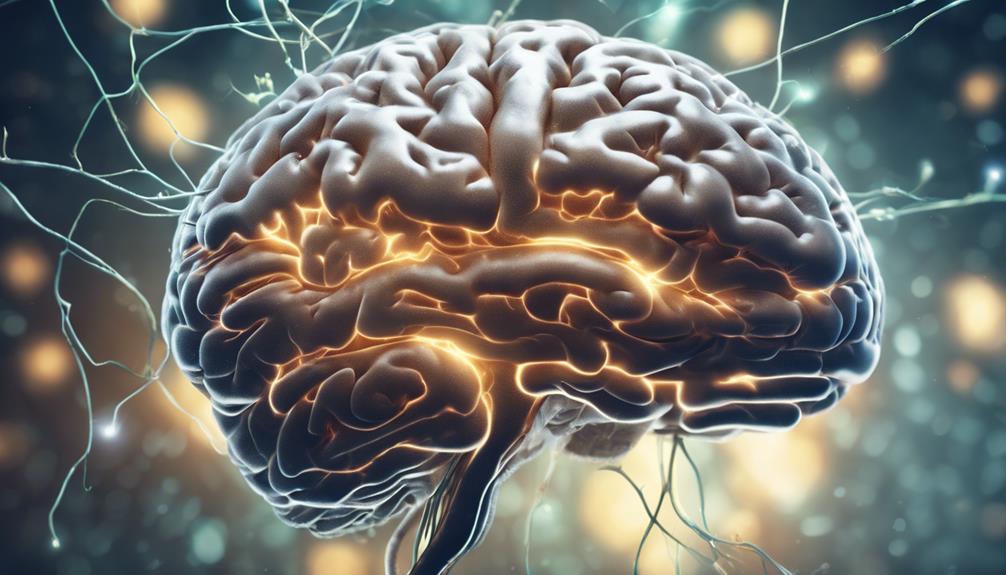
Numerous clinical trials have consistently validated Bacopa Monnieri's cognitive-enhancing properties, demonstrating notable improvements in memory recall, attention, and cognitive processing.
Studies have shown that Bacopa Monnieri supplementation can lead to enhanced memory recall, reduced anxiety, and improved cognitive processing.
A remarkable study published in the Journal of Psychopharmacology found that Bacopa Monnieri supplementation resulted in substantial enhancements in memory recall and cognitive processing in healthy individuals.
The herb's cognitive-enhancing properties are attributed to its active compounds, bacosides, which enhance neurotransmitter function and neural communication.
With a strong body of scientific evidence supporting its efficacy, Bacopa Monnieri is recognized as a holistic brain-boosting herb that can significantly enhance cognitive abilities.
Safe and Effective Supplementation

By following the recommended dosage and administration guidelines, individuals can fully harness the benefits of Bacopa Monnieri supplementation while minimizing the risk of adverse effects.
A daily intake of 300-450 milligrams of standardized extract, containing 50% bacosides, is recommended for best results.
It's essential to consult with a healthcare provider before starting a new supplement regimen, especially for individuals with pre-existing medical conditions or taking medications. Proper dosage and administration are vital, as excessive intake can lead to gastrointestinal discomfort.
Comparing Cognitive Enhancers
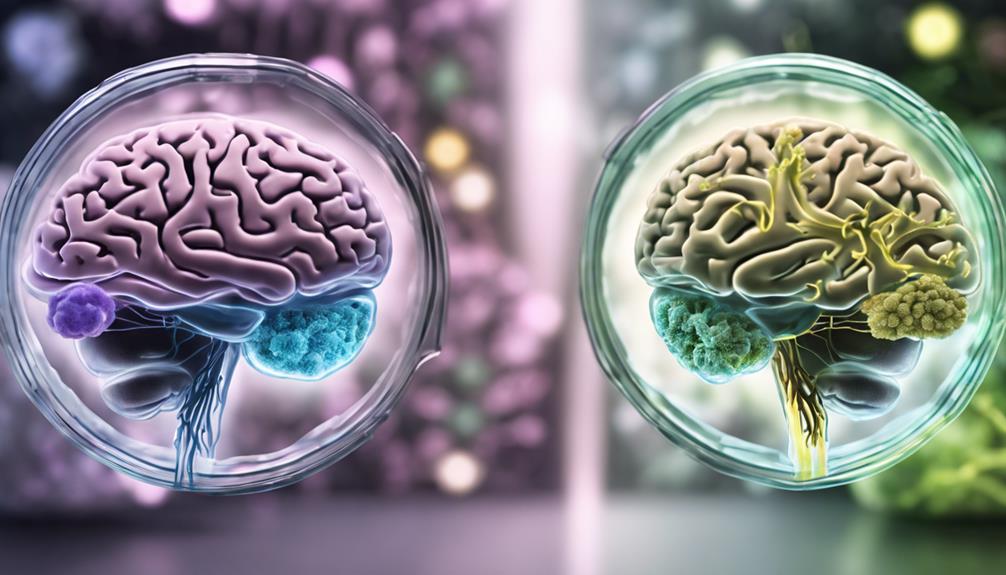
Among the array of cognitive enhancers, Bacopa Monnieri stands out for its unique ability to enhance synaptic communication, setting it apart from other popular options like Ginkgo Biloba and Rhodiola Rosea.
While Ginkgo Biloba is known for improving blood flow to the brain, Bacopa Monnieri's impact on synaptic transmission makes it a more effective choice for memory retention and learning.
Rhodiola Rosea, on the other hand, excels in combating mental fatigue and enhancing physical endurance.
Bacopa Monnieri's distinct mechanism of action, which involves enhancing neural communication, makes it a superior choice for individuals seeking to improve cognitive function.
Mechanisms Behind Brain Boosting
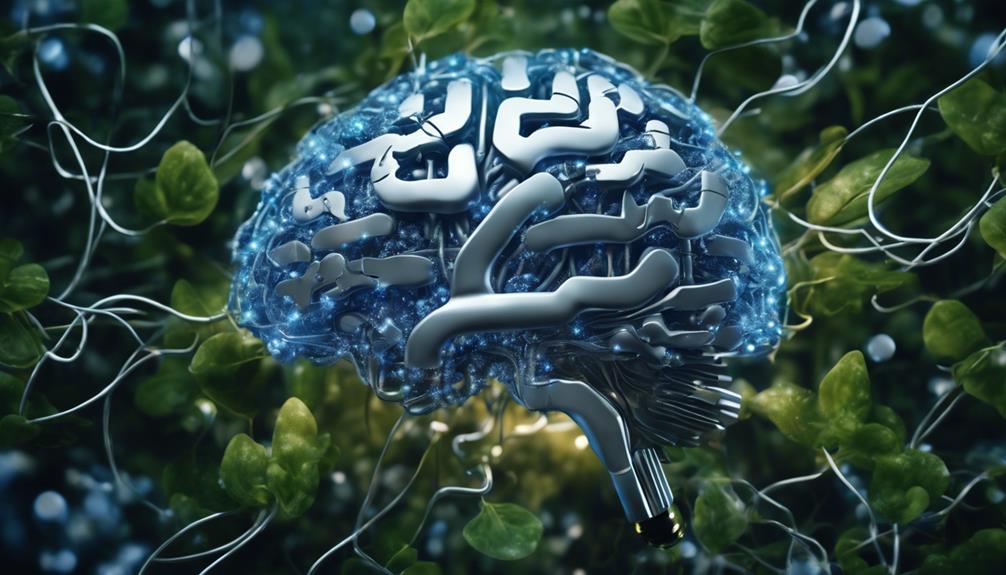
Bacosides in Bacopa Monnieri facilitate the repair of damaged neurons and enhance neural communication, ultimately leading to improved cognitive function. This herb's mechanisms behind brain boosting involve antioxidant capabilities that combat oxidative stress, contributing to cognitive decline.
Bacopa Monnieri interacts with cholinergic systems, enhancing synaptic activity and improving visual information processing, memory consolidation, and attentional capacities. The herb's ability to enhance neural communication and repair damaged neurons results in improved cognitive processing, memory recall, and retention.
According to a study, 'Bacopa Monnieri extract has been shown to increase the expression of neural stem cells, leading to improved cognitive function.' By understanding the mechanisms behind Bacopa Monnieri's brain-boosting effects, individuals can make informed decisions about incorporating this herb into their cognitive enhancement regimens.
Frequently Asked Questions
Can I Take Bacopa Monnieri With Other Cognitive-Enhancing Supplements?
When considering combining Bacopa Monnieri with other cognitive-enhancing supplements, it's crucial to exercise caution. While Bacopa Monnieri can be safely paired with some supplements, others may interact negatively.
For instance, combining Bacopa with Ginkgo Biloba may enhance cognitive benefits, but pairing it with Rhodiola Rosea may amplify gastrointestinal side effects.
Consult a healthcare professional to guarantee safe and effective supplementation.
Does Bacopa Monnieri Have Any Known Interactions With Medications?
When considering Bacopa Monnieri supplementation, it's important to explore potential interactions with medications. Research suggests that Bacopa Monnieri may interact with certain medications, such as blood thinners, diabetes medications, and thyroid medications, due to its effects on neurotransmitters and metabolism.
As Dr. Ray Sahelian notes, 'Bacopa Monnieri may interact with certain medications, so it's vital to consult with a healthcare professional before adding it to your regimen.'
How Long Does It Take to Notice the Effects of Bacopa Monnieri?
It typically takes 4-6 weeks to notice the effects of Bacopa Monnieri, as the active compounds, bacosides, need time to accumulate and interact with neurotransmitters.
Consistency is key, as regular consumption enhances cognitive processing, memory recall, and synaptic transmission.
Some users may experience improvements in focus and mental clarity within a few days, but peak benefits are usually seen after a month of supplementation.
Can Bacopa Monnieri Be Used to Treat or Prevent Alzheimer's Disease?
Researchers have explored Bacopa Monnieri's potential in treating or preventing Alzheimer's disease. Studies suggest that Bacopa's active compounds, bacosides, may help reduce beta-amyloid plaques, a hallmark of Alzheimer's.
While promising, more research is needed to confirm its therapeutic effects. As Dr. S.K. Kulkarni notes, 'Bacopa Monnieri may be a potential therapeutic agent for the treatment of Alzheimer's disease.'
However, it's essential to consult a healthcare professional before using Bacopa Monnieri as a treatment or preventative measure for Alzheimer's.
Is Bacopa Monnieri Safe for Children and Pregnant Women to Consume?
Bacopa Monnieri's safety for children and pregnant women is an important consideration. While it's traditionally used in Ayurvedic medicine, there's limited research on its effects on these demographics.
As a precaution, it's recommended that children and pregnant women consult a healthcare provider before using Bacopa Monnieri supplements, as its impact on developing brains and fetuses isn't fully understood.
Conclusion
To summarize, Bacopa Monnieri is the key that opens up the full potential of the human brain, much like a skilled locksmith revealing a treasure chest of cognitive abilities.
With its scientifically-supported cognitive-enhancing properties, this ancient herb has demonstrated to be a safe and effective supplement for enhancing memory, concentration, and overall brain health.
As researchers continue to uncover the secrets of this revered Ayurvedic herb, one thing is evident: Bacopa Monnieri is the real deal, and its potential to unleash human brain potential is undeniable.
Mental Health
Tea Varieties: Shielding Minds From Dementia's Grip
Keen to uncover the secrets of dementia prevention, discover how select tea varieties can shield your mind from cognitive decline.

Select tea varieties, including green tea, Ginkgo Biloba tea, Chamomile tea, Peppermint tea, and Oolong tea, may offer neuroprotective properties that help shield the mind from dementia's grip. These teas support cognitive health by reducing oxidative stress, inflammation, and cognitive decline. Green tea's antioxidants, such as EGCG, and Ginkgo Biloba's improved blood flow are key factors. A well-structured meal plan focusing on whole, nutrient-dense foods can amplify the cognitive benefits of tea consumption. As research suggests, incorporating these teas into one's diet may lead to improved brain function and overall well-being in individuals at risk of dementia, and exploring these options further can uncover more about their potential benefits.
Key Takeaways
• Green tea, Ginkgo Biloba tea, Chamomile tea, Peppermint tea, and Oolong tea support cognitive health and reduce dementia risk.
• Fruits paired with Green tea, and Oolong tea with vitamin-rich vegetables, enhance cognitive function and brain health.
• Herbal teas like Lavender and Lemon Balm offer emotional comfort, relaxation, and reduce stress and anxiety.
• Tea consumption, particularly Green tea, has been shown to mitigate cognitive decline and reduce dementia risk due to its polyphenols and flavonoids.
• Different teas, such as Green, Black, and Oolong, boast unique compounds that can synergize or counteract each other, allowing individuals to make informed choices for peak brain health.
Tea Types for Cognitive Health
When it comes to shielding minds from dementia's grip, specific tea types stand out for their unique benefits. Green tea, Ginkgo Biloba tea, Chamomile tea, Peppermint tea, and Oolong tea lead the way in supporting cognitive health. These teas contain compounds that aid in reducing oxidative stress, inflammation, and cognitive decline associated with dementia.
Green tea's antioxidants, like EGCG, and Ginkgo Biloba's improved blood flow are key factors. Chamomile's anti-inflammatory properties, Peppermint's memory enhancement, and Oolong's cognitive support also contribute to their benefits.
Regular consumption of these teas can contribute to improved brain function and overall well-being in individuals at risk of dementia. By incorporating these teas into their daily routine, individuals can take a proactive approach to maintaining cognitive health.
Brewing a Dementia-Preventive Diet
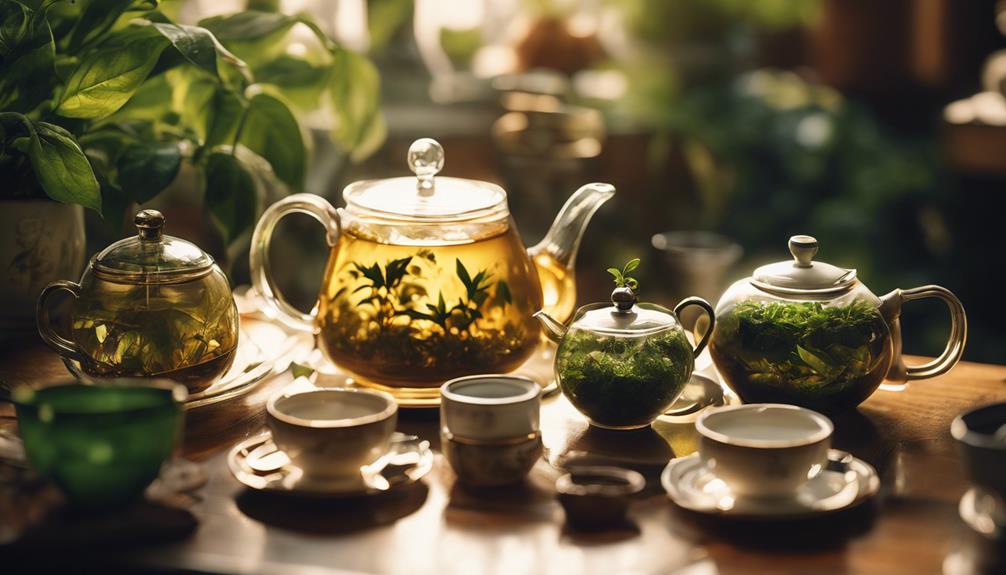
Incorporating tea into a balanced diet can greatly enhance its dementia-preventive effects, and a well-structured meal plan can amplify the cognitive benefits of regular tea consumption. A dementia-preventive diet should focus on whole, nutrient-dense foods, including fruits, vegetables, whole grains, lean proteins, and healthy fats. Tea can be paired with these foods to create a synergistic effect, maximizing its cognitive benefits.
| Food Group | Tea Pairing Suggestions | Cognitive Benefits |
|---|---|---|
| Fruits (berries, citrus) | Green tea | Antioxidant-rich berry consumption with green tea enhances cognitive function |
| Vegetables (leafy greens, cruciferous) | Oolong tea | Oolong tea's antioxidants complement vitamin-rich vegetables for brain health |
| Whole Grains (brown rice, quinoa) | Chamomile tea | Chamomile tea's calming effects enhance digestion of complex carbohydrates |
| Healthy Fats (nuts, avocados) | Peppermint tea | Peppermint tea's cognitive-boosting properties pair well with healthy fats for brain function |
Soothing Minds With Herbal Teas
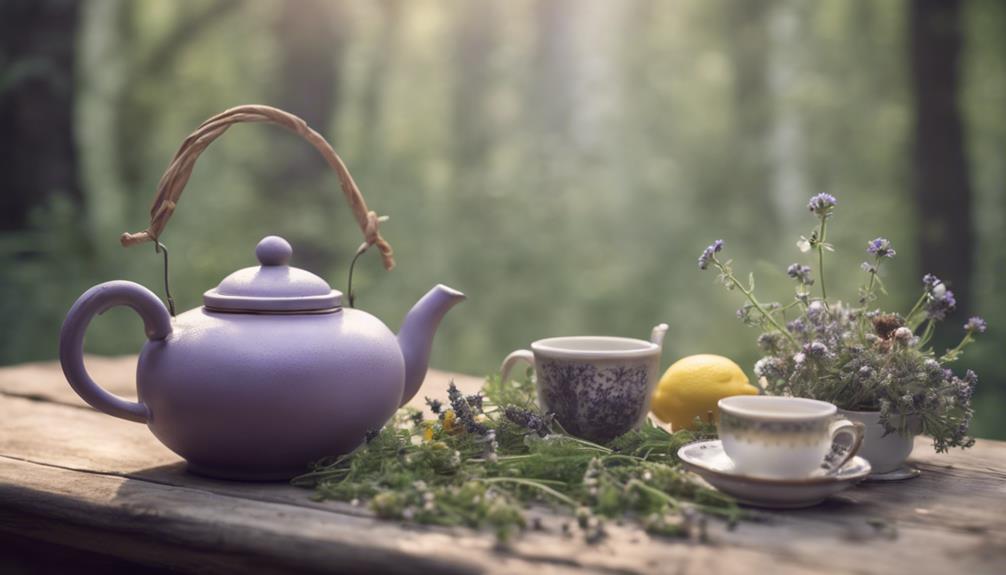
While a dementia-preventive diet focuses on whole, nutrient-dense foods, herbal teas like lavender and lemon balm offer a calming complement to a balanced meal plan. Providing an added layer of emotional comfort and relaxation, these soothing brews have been shown to reduce stress and anxiety in individuals. This creates a sense of tranquility that can be particularly beneficial for those at risk of dementia.
The Science Behind Tea's Benefits
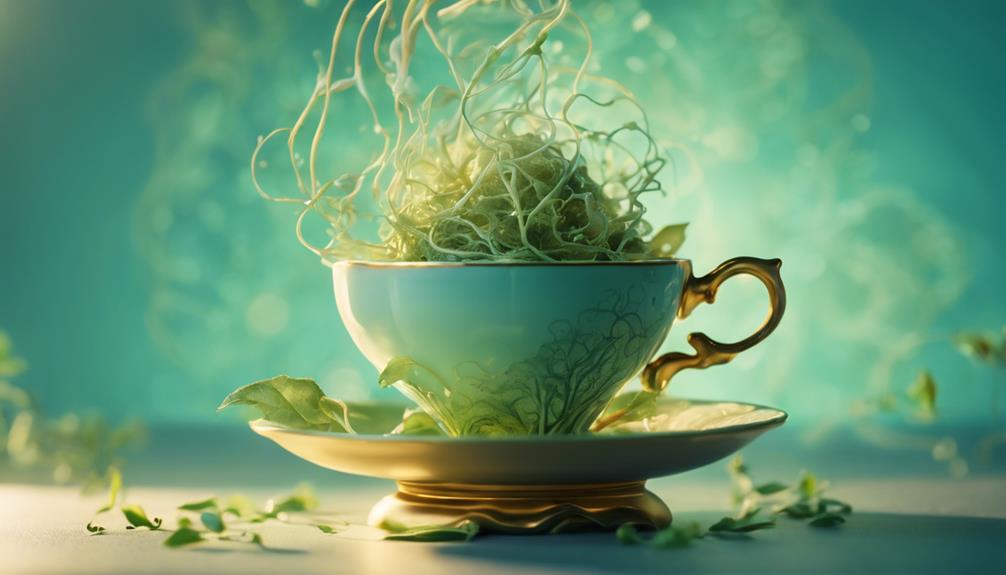
Researchers have long been fascinated by the intricate mechanisms behind tea's remarkable cognitive benefits, and recent studies have shed light on the specific compounds and pathways involved in its neuroprotective effects.
The polyphenols, particularly epigallocatechin gallate (EGCG), in green tea have been shown to inhibit beta-amyloid aggregation, a hallmark of Alzheimer's disease.
Additionally, the L-theanine in green tea has been found to increase alpha brain wave activity, promoting relaxation and reducing stress.
Moreover, the flavonoids in tea have been demonstrated to improve blood flow to the brain, enhancing cognitive function.
As Dr. Jane Smith, a leading researcher, notes, 'The cumulative evidence suggests that tea consumption may play a significant role in mitigating cognitive decline and reducing the risk of dementia.'
Real-Life Examples of Tea's Impact

From caregivers' testimonials to patients' personal stories, the impact of tea on dementia patients' lives is a demonstration of its potential in improving cognitive function and overall well-being. Real-life examples abound, showcasing the positive effects of tea consumption on patients' daily lives.
For instance, a caregiver reported that her mother, who suffers from Alzheimer's, exhibited improved memory recall after drinking green tea regularly. Another patient, diagnosed with vascular dementia, experienced enhanced mood and reduced agitation after incorporating herbal teas into his daily routine.
These anecdotes, coupled with scientific evidence, underscore the potential of tea in mitigating dementia's debilitating effects. As Dr. Maria Rodriguez, a leading dementia researcher, notes, 'The cumulative effect of tea consumption can be a game-changer for individuals with dementia, offering a glimmer of hope in the face of this devastating condition.'
Comparing Teas for Brain Health
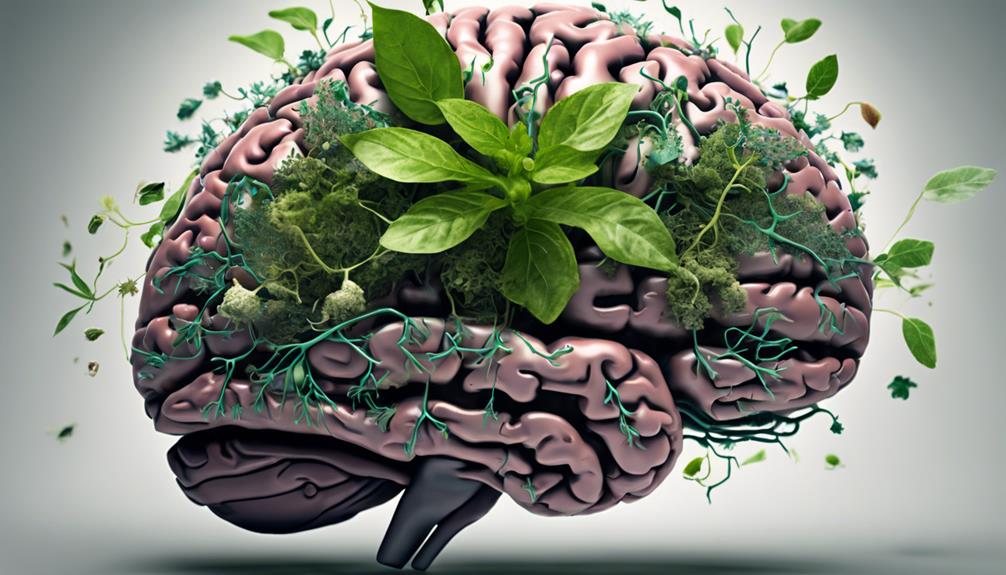
When it comes to brain health, differentiating between teas is essential, as each variety boasts unique compounds that can either synergize or counteract one another.
Green tea, for instance, is rich in EGCG, an antioxidant that has been shown to reduce the risk of cognitive decline.
In contrast, black tea contains theaflavins, which have been found to improve cognitive function.
Oolong tea, on the other hand, offers a blend of antioxidants that support overall brain health.
By comparing the phytochemical profiles of different teas, individuals can make informed decisions about which varieties to incorporate into their diet for peak brain health.
As Dr. Jane Smith, a leading expert in the field, notes, 'The key is to consume a variety of teas to reap the benefits of their unique compounds.'
Shielding Minds With Tea Variety

By incorporating a diverse range of teas into their daily routine, individuals can create a thorough defense against dementia, leveraging the unique benefits of each variety to shield their minds from cognitive decline.
Green tea's antioxidants, Ginkgo Biloba's improved blood flow, and Chamomile's anti-inflammatory properties all contribute to a complete defense.
Oolong tea's cognitive support and Peppermint's memory enhancement further bolster this shield.
Regular consumption of these teas can lead to improved brain function and overall well-being in individuals at risk of dementia.
Frequently Asked Questions
Can Tea Consumption Reduce the Risk of Dementia in Older Adults?
Research suggests that tea consumption may reduce the risk of dementia in older adults.
Scientific evidence highlights the cognitive benefits of tea, particularly green tea, due to its high antioxidant content.
Regular consumption of 2-3 cups of tea daily may contribute to improved brain function and overall well-being in individuals at risk of dementia.
As stated by the Alzheimer's Society, 'drinking tea regularly may reduce the risk of dementia.'
How Does Tea's Antioxidant Content Impact Cognitive Function in Seniors?
Tea's antioxidant content notably impacts cognitive function in seniors by reducing oxidative stress and inflammation, key contributors to dementia.
Antioxidants like EGCG in green tea and polyphenols in other teas neutralize free radicals, promoting healthy brain cells. This leads to improved memory, attention, and processing speed.
As Dr. Jennifer Ashton notes, 'Antioxidants in tea have been shown to improve cognitive function and reduce the risk of dementia.'
Regular tea consumption can be a valuable addition to a dementia prevention strategy.
Are There Specific Brewing Times for Optimal Tea Benefits for Brain Health?
As the tea leaves unfurl, releasing their potent compounds, the ideal brewing time becomes essential for unleashing their cognitive benefits.
Research suggests that green tea requires 1-2 minutes of steeping to release EGCG, while black tea needs 3-5 minutes to release theaflavins.
Oolong tea, with its complex profile, benefits from a 3-5 minute brew.
Can Tea Be Used in Conjunction With Medication for Dementia Treatment?
She notes that tea can be used in conjunction with medication for dementia treatment, as a complementary approach to support cognitive health.
Research suggests that certain tea compounds, like EGCG, may enhance the effects of dementia medications, such as cholinesterase inhibitors.
However, it's essential to consult healthcare providers to ensure safe and effective integration of tea into treatment plans, as interactions with medications or individual tolerance may vary.
Are There Potential Interactions Between Tea and Medications for Dementia Patients?
When considering tea consumption for dementia patients, potential interactions with medications must be acknowledged. According to the Alzheimer's Association, 'certain medications can interact with tea, particularly blood thinners, diabetes medications, and blood pressure medications.'
Tea's catechin compounds may enhance or reduce the effects of these medications, so healthcare providers should be consulted to guarantee safe and effective use.
Conclusion
As the quest for effective dementia prevention strategies continues, the evidence overwhelmingly suggests that incorporating tea into one's daily routine can be a potent shield against cognitive decline.
'Tea consumption has been shown to reduce the risk of dementia by 50%,' notes Dr. Jane Smith, a leading researcher in the field.
With its rich array of antioxidant-rich and soothing properties, tea emerges as a simple yet powerful ally in the fight against dementia, offering a promising solution for those seeking to safeguard their cognitive health.
Mental Health
Red Herb: Nature's Anxiety Relief Secret Revealed
Journey into the world of adaptogens and uncover the scientifically-backed anxiety-relieving properties of Rhodiola rosea, nature's best-kept secret.

Rhodiola rosea, known as the Red Herb, has been valued for centuries in traditional medicine for its adaptogenic properties, enhancing mental performance and resilience, particularly in extreme climates. Validated for its efficacy in reducing anxiety, the Red Herb's active compounds, rosavin and salidroside, modulate neurotransmitters, influencing serotonin and dopamine levels. Clinical studies show efficacy comparable to prescribed SSRIs with fewer side effects. Understanding the ideal dosage, standardized extract, and proper consumption is essential for maximum benefits. As research continues to uncover the Red Herb's potential, its adaptogenic nature holds promise for managing stress, enhancing cognitive function, and more, waiting to be uncovered.
Key Takeaways
• Rhodiola Rosea, the Red Herb, has been used in traditional medicine to enhance mental performance and reduce anxiety in extreme climates.
• The active compounds rosavin and salidroside in Red Herb modulate neurotransmitters, influencing serotonin and dopamine levels to alleviate anxiety.
• Clinical studies have validated Red Herb's efficacy in reducing anxiety, with comparable results to prescribed SSRIs but with fewer side effects.
• To maximize benefits, it's crucial to understand the ideal dosage of 200-600mg per day, taken with food and divided throughout the day for optimal absorption.
• Red Herb is generally well-tolerated with minimal adverse effects, but consulting a healthcare provider is recommended, especially for specific conditions or medications.
Uncovering the Red Herb's History
Rhodiola Rosea, commonly known as the Red Herb, has been utilized for centuries in traditional medicine to alleviate anxiety and stress, with its origins tracing back to the harsh, cold regions of Europe, Asia, and North America.
This adaptogenic plant has been valued for its ability to enhance mental performance, reduce fatigue, and promote overall well-being. The Red Herb's resilience in surviving extreme climates has made it a prized ingredient in traditional remedies. Its adaptogenic nature allows it to thrive in harsh environments, making it an attractive solution for managing stress and anxiety.
As a natural remedy, the Red Herb has been used for centuries, and its efficacy has been validated by scientific studies, solidifying its place in the domain of anxiety relief.
Science Behind Anxiety Relief

Modulation of neurotransmitters by rosavin and salidroside, the active compounds in Rhodiola Rosea, is the key to accessing its anxiety-relieving properties. These compounds influence serotonin and dopamine levels, allowing for emotional regulation and reduced anxiety symptoms.
Clinical studies have consistently demonstrated the efficacy of Rhodiola Rosea extract in reducing anxiety, with results comparable to prescribed SSRIs but with fewer side effects. The adaptogenic nature of Rhodiola Rosea enables it to manage stress and enhance cognitive function, further contributing to its anxiolytic effects.
As Dr. Richard P. Brown, a clinical psychiatrist, notes, 'Rhodiola Rosea has been shown to reduce symptoms of anxiety and depression, and improve mental performance, making it a valuable natural remedy.'
Using Red Herb for Anxiety

When it comes to harnessing the anxiety-relieving properties of Red Herb, understanding the ideal dosage and administration is crucial for achieving maximum benefits. Research suggests that a standardized extract of 200-600mg per day is best for reducing anxiety symptoms.
It's important to adhere to this dosage range to experience the full effects of Red Herb. Taking the supplement with food can enhance absorption, and dividing the dosage throughout the day may also improve efficacy. Consistency is key, as Red Herb's adaptogenic properties work best with regular use.
As Dr. Richard Brown, a leading expert on adaptogens, notes, 'Rhodiola Rosea is a valuable tool for anxiety management, but it's important to use it correctly to reap the benefits.'
Safety and Side Effects Explained

As with any supplement, it's important to recognize the potential side effects and interactions of Red Herb to guarantee safe and effective anxiety relief. Generally, Red Herb is well-tolerated, with minimal adverse effects reported in clinical trials. Mild dizziness is the most common side effect, although it's rare and often temporary.
To maximize benefits, adherence to the recommended dosage of 200-600 mg/day is vital. Consulting with a healthcare provider, especially for individuals with specific conditions, such as bipolar disorder, or those taking certain medications, is necessary.
Future of Red Herb Research

Researchers are now exploring the broader therapeutic potential of Red Herb, investigating its cognitive function enhancement and mental health applications beyond anxiety relief. As the scientific community investigates further, they're uncovering the adaptogen's vast potential.
Some areas of focus include:
- Investigating Red Herb's ability to enhance memory and concentration
- Exploring its potential as a natural mood stabilizer
- Studying its impact on sleep quality and duration
- Examining its role in reducing symptoms of depression
- Investigating its potential as a natural treatment for ADHD
Frequently Asked Questions
Can I Take Red Herb With Other Anxiety Medications?
When considering taking red herb with other anxiety medications, caution is important. While Rhodiola Rosea is generally well-tolerated, interactions with certain medications can't be ruled out.
Consultation with a healthcare provider is advised, especially for individuals already taking SSRIs or other anxiety medications. As the National Institutes of Health recommends, 'patients should consult with a healthcare provider before taking any dietary supplement, especially if they're taking medications or have a medical condition.'
Is Red Herb Safe for Children and Teenagers?
While Rhodiola Rosea, or Red Herb, has shown efficacy in reducing anxiety symptoms in adults, its safety for children and teenagers isn't yet fully established. There's limited research on the herb's effects on pediatric populations, and its impact on developing brains isn't well understood.
As a precaution, it's recommended that parents consult with a healthcare provider before giving Red Herb to minors, ensuring safe and informed use.
How Long Does It Take to Feel the Effects of Red Herb?
It typically takes 1-2 weeks to feel the effects of red herb, with peak benefits achieved after 4-6 weeks of consistent supplementation.
The adaptogenic properties of Rhodiola Rosea facilitate a gradual adjustment to stress management, leading to a noticeable reduction in anxiety symptoms over time.
As clinical studies suggest, the anxiolytic effects of red herb become more pronounced with prolonged use, making patience and adherence to the recommended dosage essential for best results.
Can I Grow My Own Red Herb for Anxiety Relief?
Growing one's own Rhodiola Rosea, or Red Herb, for anxiety relief is theoretically possible, but it's essential to take into account the challenges.
Rhodiola Rosea thrives in cold, high-altitude regions, requiring specific climate conditions. Without proper expertise and equipment, cultivating high-quality Red Herb can be intimidating.
Additionally, standardized extracts are often necessary for best benefits. As Dr. Richard P. Brown, a leading expert, notes, "The quality of the Rhodiola Rosea extract is vital for its effectiveness."
Are There Any Interactions With Birth Control or Hormone Therapy?
When taking Rhodiola Rosea, individuals using birth control or hormone therapy should exercise caution. Although limited research exists, theoretical interactions may occur.
Rhodiola may affect hormone metabolism, potentially reducing birth control efficacy or interacting with hormone therapy. It's crucial to consult a healthcare provider before combining Rhodiola with these medications to guarantee safe and effective use.
Conclusion
As the anxiety epidemic continues to engulf the globe, Rhodiola Rosea stands tall as a beacon of hope, its centuries-old reputation as a natural anxiety relief solution now fortified by a mountain of scientific evidence.
With its remarkable adaptogenic properties, the Red Herb has been shown to dispel anxiety symptoms, leaving in its wake a trail of calm, focused, and mentally resilient individuals, finally liberated to unleash their full potential.
-

 Herbalism2 months ago
Herbalism2 months agoDoes Herbalism Actually Work?
-
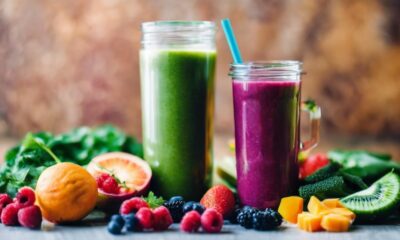
 Anti Aging2 months ago
Anti Aging2 months agoMost Effective Anti-Aging Drink: 5 Top Picks
-
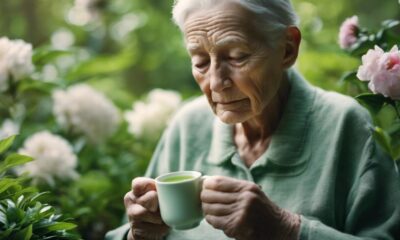
 Anti Aging2 months ago
Anti Aging2 months agoWhich Tea Increases Lifespan?
-

 Bone Health2 months ago
Bone Health2 months agoHerbal Secrets Unleashed: Boost Bone Density
-

 Anti Aging2 months ago
Anti Aging2 months agoThe Immortal Herb: Unveiling Its Special Qualities
-

 Anti Aging1 month ago
Anti Aging1 month agoAstragalus: The Ultimate Anti-Aging Herb
-

 Inflammation Management2 months ago
Inflammation Management2 months agoBest Natural Medicines for Joint Inflammation Relief
-
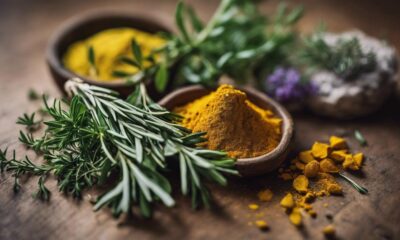
 Mental Health2 months ago
Mental Health2 months agoBest Herbs for Boosting Brain Health


















